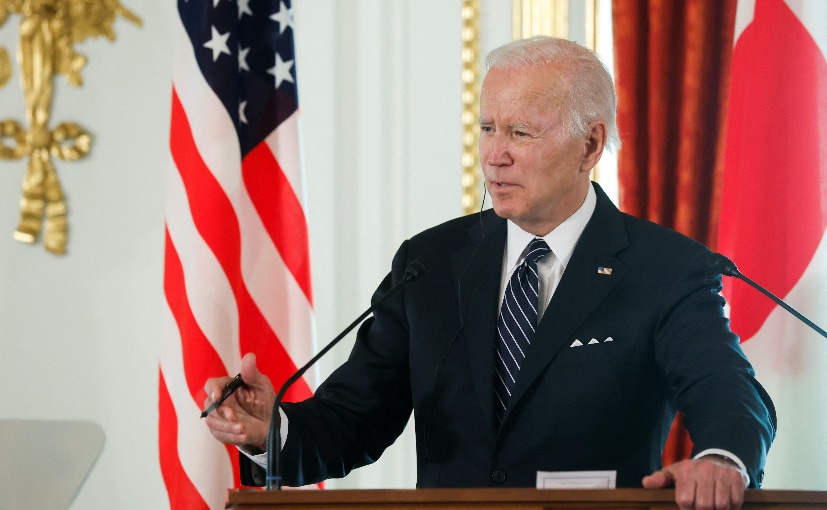Biden Sidelined Global Energy Partners With Record Emergency Oil Release: Sources

The United States announced a record-sized release of emergency crude oil reserves in March without consulting partners in the International Energy Agency, leaving them scrambling to match with releases of their own, according to two sources familiar with the matter. Unilateral action by Washington to address global supply or price issues risks undermining the U.S. relationship with the IEA, the world's energy watchdog that normally oversees international releases from emergency stockpiles, and could raise questions about the continued relevance of the group.
The Paris-based IEA, which groups together 31 mostly industrialized countries, was established after the 1973 oil price shock to ensure continuous energy supplies to its members in the event of an embargo, war, or devastating storm.
The group's members have become worried that U.S. President Joe Biden is using the Strategic Petroleum Reserve (SPR) to tamp down rampant domestic inflation for political reasons, instead of protecting consumer countries from a global supply disruption, according to the sources who declined to be identified because of the sensitivity of the topic.
"The IEA was embarrassed by the (U.S.) release which was at the start done essentially unilaterally by the U.S.," said a source familiar with the diplomacy around the release.
"It is the common understanding of IEA members that we must cooperate as a whole," said another source, this one from an IEA member country, who said the U.S. announcement came as a surprise.
The IEA told Reuters it had been in close contact with all member countries including the United States in the run-up to its two stock release announcements this year: "This consultation as well as the decisions for taking collective action were conducted in line with IEA procedures."
The U.S. Department of Energy said the United States had been in "frequent contact" with the IEA and its member states on energy security leading up the announcement, but confirmed its decision to release the oil was "independent" of the IEA.
It did not comment on whether the United States shared in advance the timing and volume of its release.
"The United States and other IEA members countries can and have, independently, released oil from their strategic reserves separate from any IEA collective action," the department said in a statement to Reuters.
The White House did not immediately respond to a Reuters request for comment.
At issue is the U.S. announcement on March 31 that it would unleash 180 million barrels from the SPR at a pace of 1 million barrels per day to bring down soaring global energy prices and address cuts in Russian oil supplies since its invasion of Ukraine in February.
The sources told Reuters that Washington had not informed the IEA or its members that the announcement was coming - a break with past precedent - and that the record-sized volume, over three times bigger than any previous release from the SPR, was a surprise.
The U.S. announcement came one day before members of the IEA were due to meet to discuss a coordinated release. Following the meeting, which was chaired by U.S Energy Secretary Jennifer Granholm, the IEA announced a coordinated release had been agreed but gave no detail on volumes.
At that point, the IEA's leadership began bilateral meetings with other members to cobble together contributions, according to the two sources. After a week of diplomacy, it secured commitments from its non-U.S. members to unleash another 60 million barrels combined. [nL2N2W41DP]
That 60 million-barrel figure was relatively small, however. Per the IEA's rules, a member country's contribution to a coordinated emergency release should roughly match the proportion of its oil consumption within the group.
With the United States accounting for about half of consumption among members, the IEA contribution should have roughly matched the U.S. draw.
"That wasn't doable," the source familiar with the diplomacy said. "It was impossible as no one had such stocks."
"The optics of the release being done 75% in the U.S. and 25% in the rest of the world are simply strange," the source added.
The IEA's announcement glossed over the mismatch, detailing a 120 million-barrel release, with 60 million of that coming from the United States in the first two months - effectively ignoring the fact the U.S. aimed to keep the oil flowing for an additional four months.
The Biden administration's release marked the second time in six months that it had signed off on a big drawdown from the SPR without the IEA's blessing.
In November, the United States pledged a release of 50 million barrels to tame prices rising due to a sudden rebound in demand from the darkest days of the COVID-19 pandemic.
While some IEA members like South Korea, Britain and Japan made contributions to that release, the agency itself sat out because it saw no major supply disruption to address at the time.

After Russia's invasion, however, IEA member countries saw fit to organize a coordinated release. On March 1, they announced a release of 60 million barrels - half from the United States - to counter likely disruptions to supplies from Russia, a leading global oil and gas producer.
Biden's Republican opponents have slammed him for his move to release the 180 million barrels from U.S. stockpiles, arguing that the decision was political and that he should be encouraging domestic oil production instead.
Record-high prices for gasoline in the United States are seen as a top vulnerability to Biden's Democratic party leading into mid-term elections in November.
Biden ran on a promise to phase out fossil fuels to help fight climate change, but his administration has not successfully imposed any curbs on the industry and has in recent months urged drillers to speed up production to bring down prices.
(This story has not been edited by NDTV staff and is auto-generated from a syndicated feed.)
Latest News
 Jafar Rizvi | Feb 18, 2026Nissan Gravite: Variants, Features, Prices ExplainedThe Gravite MPV is offered in four key trim levels and an additional launch edition. Here is what each variant has to offer.1 min read
Jafar Rizvi | Feb 18, 2026Nissan Gravite: Variants, Features, Prices ExplainedThe Gravite MPV is offered in four key trim levels and an additional launch edition. Here is what each variant has to offer.1 min read Jafar Rizvi | Feb 17, 2026Nissan Gravite Launched In India At Rs 5.65 LakhThe Gravite marks Nissan’s entry into the subcompact MPV segment in India, while it shares its underpinnings with the Renault Triber.3 mins read
Jafar Rizvi | Feb 17, 2026Nissan Gravite Launched In India At Rs 5.65 LakhThe Gravite marks Nissan’s entry into the subcompact MPV segment in India, while it shares its underpinnings with the Renault Triber.3 mins read Preetam Bora | Feb 17, 2026Opinion: India’s Electric Scooter Race Heats UpIndia’s electric scooter story is no longer about if it will scale, but who will win when it does.8 mins read
Preetam Bora | Feb 17, 2026Opinion: India’s Electric Scooter Race Heats UpIndia’s electric scooter story is no longer about if it will scale, but who will win when it does.8 mins read car&bike Team | Feb 17, 2026Audi SQ8 India Launch On March 17The SQ8 will fill the gap between the standard Q8 and the RS Q8 in the brand’s India lineup.2 mins read
car&bike Team | Feb 17, 2026Audi SQ8 India Launch On March 17The SQ8 will fill the gap between the standard Q8 and the RS Q8 in the brand’s India lineup.2 mins read car&bike Team | Feb 17, 2026Maruti Suzuki e Vitara: Variants, Features, Specifications ExplainedThe e Vitara will be offered in three variants Delta, Zeta and Alpha across two battery pack options. Here’s a rundown of what each variant has to offer.1 min read
car&bike Team | Feb 17, 2026Maruti Suzuki e Vitara: Variants, Features, Specifications ExplainedThe e Vitara will be offered in three variants Delta, Zeta and Alpha across two battery pack options. Here’s a rundown of what each variant has to offer.1 min read Jaiveer Mehra | Feb 17, 2026Maruti Suzuki e Vitara Launched In India; Prices Start At Rs 10.99 Lakh Under Battery Subscription ModelMaruti’s first ever EV goes up against the likes of the Hyundai Creta Electric and Mahindra BE 6.2 mins read
Jaiveer Mehra | Feb 17, 2026Maruti Suzuki e Vitara Launched In India; Prices Start At Rs 10.99 Lakh Under Battery Subscription ModelMaruti’s first ever EV goes up against the likes of the Hyundai Creta Electric and Mahindra BE 6.2 mins read
 Jafar Rizvi | Feb 15, 2026Maruti Suzuki Victoris: Long-Term Review - Report 1The Victoris is Maruti’s latest offering for the Indian market, and after spending some time with it, here are a few early impressions.1 min read
Jafar Rizvi | Feb 15, 2026Maruti Suzuki Victoris: Long-Term Review - Report 1The Victoris is Maruti’s latest offering for the Indian market, and after spending some time with it, here are a few early impressions.1 min read Bilal Firfiray | Feb 12, 2026BMW X3 30 xDrive M Sport Review: The Driver’s SUV ReturnsRange-toppingX3 30 xDrive M Sport brings back the fun with 255bhp and genuine enthusiast appeal. Does this performance-focused SUV stand out?5 mins read
Bilal Firfiray | Feb 12, 2026BMW X3 30 xDrive M Sport Review: The Driver’s SUV ReturnsRange-toppingX3 30 xDrive M Sport brings back the fun with 255bhp and genuine enthusiast appeal. Does this performance-focused SUV stand out?5 mins read Bilal Firfiray | Feb 11, 2026Mercedes-AMG CLE 53 Coupe Review: The Goldilocks AMG?The Mercedes-AMG CLE 53 Coupe is a concoction of hooliganistic performance and everyday usability. Here’s why this Rs 1.5 crore two-door AMG might be the perfect modern sports coupe for India.6 mins read
Bilal Firfiray | Feb 11, 2026Mercedes-AMG CLE 53 Coupe Review: The Goldilocks AMG?The Mercedes-AMG CLE 53 Coupe is a concoction of hooliganistic performance and everyday usability. Here’s why this Rs 1.5 crore two-door AMG might be the perfect modern sports coupe for India.6 mins read Girish Karkera | Feb 11, 2026Toyota Ebella EV Review: Compact And Fun-To-Drive With The Promise Of Stress-Free AftersalesNo hiding the fact that it is a clone of the Maruti Suzuki eVitara, but the first all-electric Toyota in India is reasonably well-rounded8 mins read
Girish Karkera | Feb 11, 2026Toyota Ebella EV Review: Compact And Fun-To-Drive With The Promise Of Stress-Free AftersalesNo hiding the fact that it is a clone of the Maruti Suzuki eVitara, but the first all-electric Toyota in India is reasonably well-rounded8 mins read Bilal Firfiray | Feb 10, 2026Tata Punch EV Long Term Review: Small EV With A Big-Hearted PersonalityWith the new Punch EV Facelift just around the corner, we decided to take a look at what it excels at and what could be improved.7 mins read
Bilal Firfiray | Feb 10, 2026Tata Punch EV Long Term Review: Small EV With A Big-Hearted PersonalityWith the new Punch EV Facelift just around the corner, we decided to take a look at what it excels at and what could be improved.7 mins read


























































































































